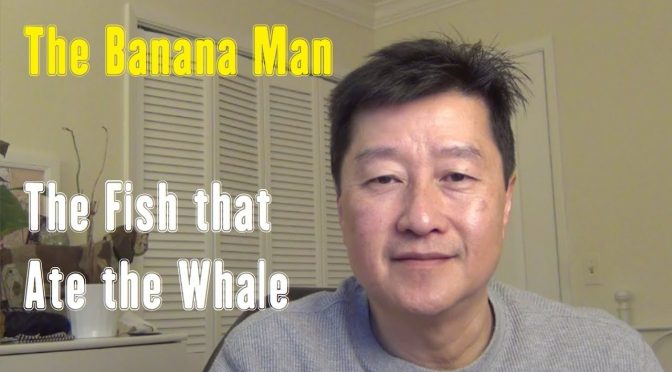This story is based on the book “The Fish That Ate The Whale” by Rich Cohen.
I’m going to tell you a story about this guy, Sam Zemurrary, the Banana Man.
Some interesting facts about banana: banana is technically not a fruit but a berry that grow on a herb plant, not tree, and is tallest grass and largest plant without a woody trunk. Banana plant grows from a rhizome (like orchid or lotus) and has no roots and no seeds so it can only be propagated from a cutting. In other words, a banana species are all clones. This means, one disease that kills one banana plant can wipe out an entire species due to lack of genetic diversity. This has happened to a few species like “Big Mike” and “Cavendish.” So enjoy your banana while you can!
Enough about banana but why does it have to do with Sam Zemurray, the Banana Man? I don’t think there another person whose story is more entangled with a fruit or a berry than he was. Let me tell you his story.
Sam Zemurray, a Russian Jew, arrived in America in 1891 at age fourteen. He was tall, gangly and penniless. He saw a banana in 1893 for the first time, 20 years into American banana trade during the hay day of the steam-engine boats. Banana just became a popular, exotic imported luxury fruit. It can’t be easily grown in the US and even more difficult to transport due to its short shelf life and natural vulnerability. The 6-ft-3 Zemurray started out as a fruit peddler, a banana hauler, then a dockside hustler. He settled in New Orleans, got married at age of 31. His daughter was born a year later. He wanted to give her the best he could offer like most immigrant parents. To do that, he needs to grow his company and his supplier base. Where? Central America.
The first time Sam Zemurray visited Honduras, he bought 5000 acers of north-coast “junk” land immediately for $2000, all borrowed. Then he borrowed more and bought more land. Leveraging his knowhow from growing up in a Russian farm, he turned the land into a fertile banana farm. He bribed the Honduras government officials into giving him the best tax break. When the Honduras government tried to back out of the tax exemption sweet deal, he organized a mercenary team and overthrew the government. He ended up with an even better tax break.
When he expanded his plantation into Guatemala, he started butting against United Fruit’s territory. United Fruits was the biggest banana company at that time. As the conflicts between the two companies escalated within Guatemala, the US government stepped in to avoid destabilizing the region. Urged by the US government, both companies were forced to merge and occupy 64% of banana market share with anti-trust immunity. Zemurray walked away with shares of United Fruits, worth about $30M in 1929, or $420M now.
Was he ready to retire? Not quite. The Great Depression hit, he saw his shares of United Fruits dropped to only 10% or $3M. He came up with plan to turn around the company. When he presented his plan to the Board of Director, he was mocked, and turned away. A few months later, he returned to the Boston headquarter with proxy votes and fired the board and the CEO. Zemurray took over United Fruits as its CEO.
Then World War II happened. The banana ships were being sunk by German’s U-boats during transport. If that wasn’t bad enough, a personal tragedy hit him hard when his son’s, Sam Zemurray Jr’s plane went down and died in Africa serving as an Air Force pilot during the war. He was heart broken and started searching the true life meaning.
Up to 1948, he was never involved in any political advocacy for Jews. Surprisingly, he stepped down from his CEO position, and devoted his time to making sure Israel secured its statehood with 2/3 of the United National’s General Assemblies by influencing or bribing the several central America countries to vote yes. The state of Israel was born.
Zemurray eventually returned to United Fruits, which was forced to break up by US government to 3 smaller companies after involving itself in Central America conflicts during the Communist uprising – central character, Fidel Castro. Today we see pieces of United Fruits in Dole, Del Monte and others. United Fruits eventually became Chiquita as we know today after several ownership changes.
Samuel Zemurray died in 1961 at the ripe age of 84 with an estimated fortune of $30M, a big chunk of which he donated to local universities like Tulane.
Is Sam Zemurray a story of rages-to-riches immigrant’s fulfilling the American dreams, or a shrewd businessman sparing no means, mercy to get the results mimicking American’s aggression in Central America, or a man truly living life to its purposes? I would say, “all of the above.”

